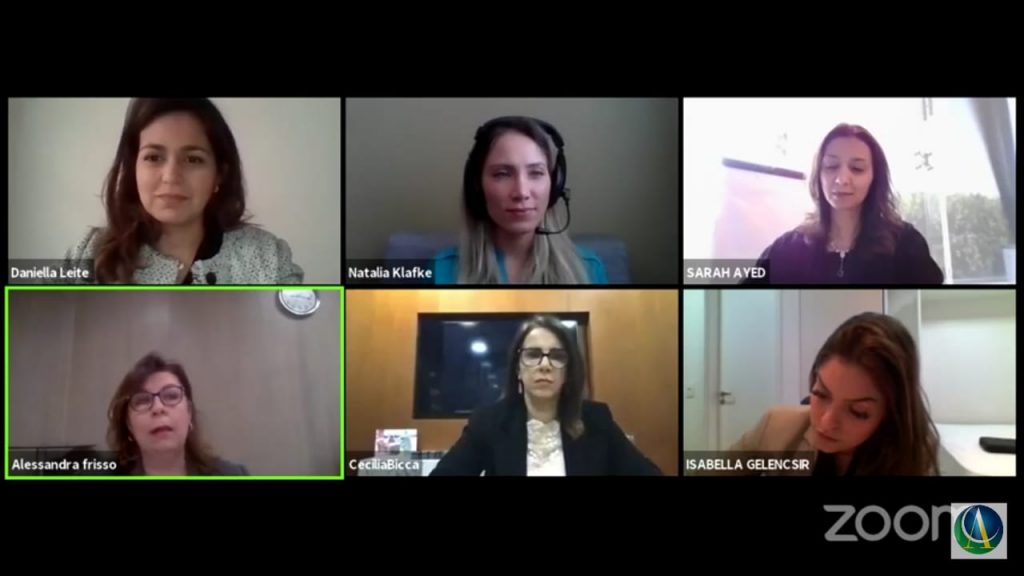São Paulo – One of the challenges facing businesses looking to embrace the Low Touch Economy is to keep up with the level of connectivity it requires. “It implies working to democratize technology,” Radix Engenharia e Software general manager Natalia Klafke said. She was a panelist in ‘Low Touch Economy: A New Way of Doing Business,’ a webinar hosted by the Arab Brazilian Chamber of Commerce (ABCC) this Wednesday (15). The online event was viewed by over 800 people in Brazil and the world over, and it also saw the launch of the ABCC Women’s Committee.
Klafke explained that the Low Touch Economy concerns a sales process with low physical interaction levels. “This is not a novel concept; it has simply been fast-tracked by the catastrophic effect [of the pandemic],” said Klafke. Also featured in the webinar, ABCC president Rubens Hannun remarked that this speed was what placed the topic under discussion. “This subject became more important with the pandemic, but it was already a trend that was being worked towards,” Hannun argued.

Klafke notes that the process requires preparations, connectivity-wise, that not every business has been able to keep up with. “We’ve had small businesses that were unable to communicate with their clients. There’s the challenge of connectivity. Will new players emerge, or will the existing platforms keep growing and go on to become major hubs?”, she inquired.
To explain which industries will undergo irreversible changes, she mentioned the evolution of streaming platforms such as Netflix, which outdid giants of the likes of Blockbuster. “From the client’s perspective, all you want is to view content while having the most options possible. People are not willing to go back to the previous model anymore,” said Klafke, for whom some businesses are agents of change, while some will adapt and some will disappear.
She said two industries are most impacted by restrictions on physical contact: continuing demands – like tourism, bars and restaurants, which people still want, but new safety requirements must be met – and ones where demand has been resignified – like property rental and some luxury items. Here, repositioning will be in order, and maybe the demand will go away.
Businesses will need to watch out for societal changes and then assimilate the new reality. “There’s this desire to get shopping again, but at the same time people are still unsure. If establishments make the necessary adaptations and find the right compromise, then we’ll have a promising future ahead of us,” pondered ABCC commercial manager Daniella Leite, who moderated the webinar.
Ana Paula Kagueyama, the senior Global Client Services director and site leader for Paypal Brasil, discussed the company’s experience. Staff started working from home three days after the pandemic arrived in Brazil. Amid the process, she started dealing with a growing number of companies that were selling online for the first time. “One of the things we looked into when we looked at salespeople who didn’t know how to operate was to offer a attractive rates,” she said. Other solutions included longer deadlines, flexible charges and increased shopper protection.

Kagueyama explains the importance of building contact channels to keep up with the flow. “This was in our agenda, and we did it earlier than we had planned. That gave us speed and the ability to serve many more clients than before. And it’s also really important to look at how clients are being treated,” she said.
In Brazil, Kagueyama saw demand go up for streaming services, education, and home and gardening items. She remarks that the hike in online orders meant watching out for frauds and having partners with the tools to keep that in check.
Mobilisa Soluções Tecnológicas CEO Isabella Gelencsir asked the panelists about how technology can convey a customized experience right now. “Even though it’s virtual, it’s still a relationship between people. I’d focus on how we’ll transform our business to humanize our relationships, which take place in the virtual realm now,” said Klafke.
For Kagueyama, there’s also the need to anticipate shopping trends and even problems. “Technology can be helpful when it comes to a world of online transactions and eliminating some of the problems clients may encounter. And finally, when we speak of financial inclusion, we have 70 people with no bank accounts. Right now, we are seeing people having trouble withdrawing cash [from the government’s pandemic aid] because they don’t have bank accounts. And technology can be really helpful, we believe,” she said.
In responding to a question from High Class Corporate Services’ Cecilia Bicca Paetzelt regarding the tools required to embrace change, Klafke explained that some solutions will be indispensable going forward. “There’s no going back when it comes to offering an online platform to communicate and interact with your client. What’s transitory is socialization experiences, relaxation options, and health and care services. These businesses are temporarily limited, and yet we see that people still need these services and products. These businesses need to figure out how to stay safe in a three- to four-year timeframe,” she explained.
Panelists in the webinar included Jeddah Chamber of Commerce Chief Strategy Officer Yomna El Sheridy, of Saudi Arabia, and Special Foods director and CEO and Business Women of Egypt 21 chair Yomna El Sheridy, of Egypt. Previously filmed statements from the ABCC Women’s Committee president Alessandra Frisso and directors Claudia Yazigi Haddad, Janine Bezerra de Menezes and Silvia Antibas were shown.
Here’s another story on the webinar:
Arab businesswomen discuss their pandemic experiences
You can watch the full webinar here:
Translated by Gabriel Pomerancblum




